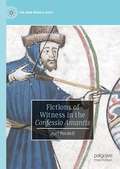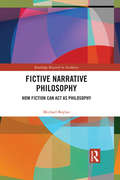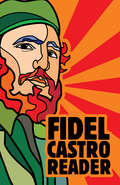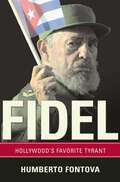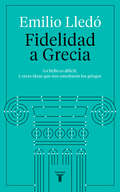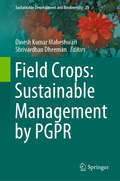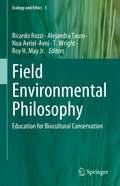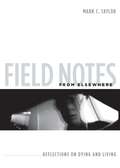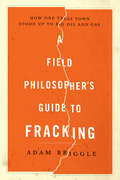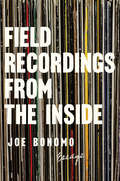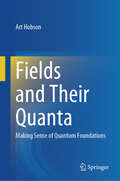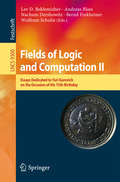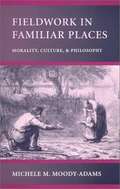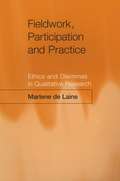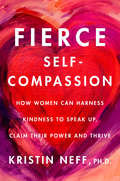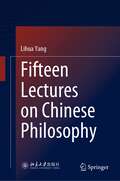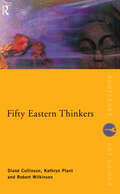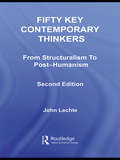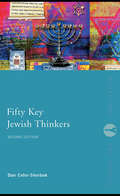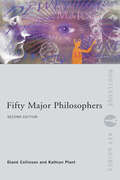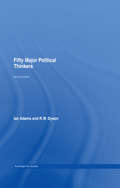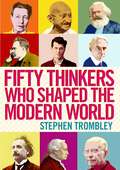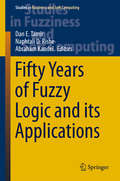- Table View
- List View
Fictions of Witness in the Confessio Amantis (The New Middle Ages)
by Joel FredellFictions of Witness in the Confessio Amantis details the first years of the Confessio’s material history and offers a major revision to a century’s old narrative of political revision and conversion around the trauma of 1400. Joel Fredell argues for “late stage” revisions by Gower to his great poem in Middle English from the late 1390s up to Gower’s death in 1408. This approach, new to scholarship for Ricardian and Lancastrian literature, demands profound re-evaluation of Gower's poetic persona and its entanglement in the opening and closing books of the Confessio. It offers a reassessment of the political and literary relationships between versions dedicated to Richard II and Henry IV. It repositions Gower's laureate status in a London world of deluxe book production that created a canon of Ricardian poets linked to their fifteenth-century inheritors. Finally, it identifies for the first time how late medieval authors designed their poetry as fictional artifacts that witness history from quasi-chronicles like Maidstone’s Concordia or Richard the Redeless, quasi-petitions like the Lollard “Petition to the King and Parliament,” quasi-epistles that begin so many texts, quasi-transcripts such as the Record and Process of the Deposition of Richard II, and so on.
Fictive Narrative Philosophy: How Fiction Can Act as Philosophy (Routledge Research in Aesthetics)
by Michael BoylanWhat is the philosophical voice within literature? Does literature have a voice of its own? Can this voice really be philosophical in its own right? In this book, Michael Boylan argues that some literary works indeed can make their own unique claims in different areas of philosophy. He calls this method fictive narrative philosophy. The first part of the book presents an overview of traditional thinking about philosophy and literature across classical, modern, and contemporary periods. It does not seek to denigrate these methods of studying literature, but rather to ask more of them. The second part then sets out a rigorous definition of what constitutes fictive narrative philosophy. This definition outlines detailed conceptions of the methods of presentation, audience engagement, logical mechanics, and constructional devices of fictive narrative philosophy. The author brings this definition to bear on individual authors and works that can be considered prime examples of fictive narrative philosophy. Finally, the book sets out why and when fictive narratives might be more favorable than traditional philosophical discourse, and how the concept of fictive narrative philosophy can move teaching and scholarship forward in a positive direction. Fictive Narrative Philosophy presents an entirely new and unique approach in which literature can be a form of philosophy. It will appeal to scholars and upper-level students interested in philosophy and literature.
Fidel Castro Reader
by Fidel Castro David DeutschmannAn outstanding new anthology of one of history's greatest oratorsHere, at last, is a comprehensive anthology presenting the voice of one of history's greatest orators, Fidel Castro. Love him or hate him, there is no denying he is a "master of the spoken word," as Gabriel García Márquez has described him.Emerging in the 1960s as a leading voice in support of Third World anticolonial struggles and continuing to play a role in the antiglobalization movement of today, Fidel Castro remains an articulate and penetrating--if controversial--political thinker and leader, who has outlasted ten hostile US presidents.His direct, forthright approach, his incredible grasp of diverse economic, historical, and cultural topics, and his idealism stand in stark contrast against the spin and superficiality of most political leaders.Covering five decades of Fidel's speeches, this selection begins with his famous courtroom defense ("History will Absolve Me"), and also includes his speech on learning of Che Guevara's death in Bolivia, his analysis of the collapse of the Soviet Union, and his response to the 9/11 terrorist attacks. With his declining health and the emergence of new leaders such as Hugo Chávez in Venezuela and Evo Morales in Bolivia, this book sheds light not just on Castro's mighty role in Latin America's immediate past, but also on his legacy for the future.The Fidel Castro Reader includes a chronology of the Cuban Revolution, an extensive glossary and index as well as 24 pages of photos. As the first anthology of Castro's speeches to be published in English since the 1960s, this is an essential resource for both scholars and general readers. "Fidel's devotion to the word is almost magical." -- Gabriel García Márquez "Fidel is the leader of one of the smallest countries in the world, but he has helped to shape the destinies of millions of people across the globe."--Angela Davis "Fidel Castro is a man of the masses... The Cuban revolution has been a source of inspiration to all freedom-loving people."--Nelson Mandela "Fidel's is a singing and dancing intellect."--Alice Walker "The editors] have done an admirable, even heroic, job of editing and excerpting this reader [which] serves a purpose for both historians and politicos." --Foreword magazine
Fidel: Hollywood's Favorite Tyrant
by Humberto Fontova"Cuba's own Elvis"--that's what Dan Rather calls him. Funny name for a man who has threatened the United States with nuclear war, who has made common cause with Islamic terrorists against the United States, and whose people risk death to escape him. But there's a lot that Hollywood liberals and other Fidel Castro admirers would rather you didn't know about the dictator of Cuba--like how he imprisoned more people as a percentage of population than Hitler or Stalin; how Fidel's firing squads killed thousands of Cubans; how Fidel's subjects would rather inject themselves with AIDS than live under his tyranny.Drawing on a wealth of research--including interviews with former Castro regime officials, anti-Castro freedom fighters, and Castro's political prisoners--acclaimed author Humberto Fontova reveals the ugly face of the Castro regime. Along the way, he punctures some of the egregious myths about Cuba: The Motorcycle Bore: The real Che Guevara--not the rebel rock star of T-shirt fame, but a battlefield incompetent, a puritan-Stalinist bore, and the man who sent thousands of innocent Cubans to the firing squadsCommunist Economics 101: How Castro took Cuba from being a First World economy that had to turn away European emigrants to a country that even impoverished Haitians won't emigrate to, with among the highest suicide and abortion rates in the worldThe Saddam Hussein Next Door: How Castro has not only had nuclear weapons (and wanted to launch them) but has plotted massive terrorist outrages against the United StatesFidel the anti-black racist and unrepentant Communist--and his long list of useful idiots: from Jesse Jackson to Oliver Stone, George McGovern to Ted Turner, Bill Clinton to Steven Spielberg, to Katie Couric and many othersThe Left's favorite racism: against conservative Cuban-Americans Fidel: Hollywood's Favorite Tyrant is a stunning exposé of the real Fidel Castro and of the hypocrisy, ignorance, and inexcusable appeasement that makes his liberal admirers notorious.
Fidelidad a Grecia: Lo bello es difícil, y otras cosas que nos enseñaron los griegos
by Emilio Lledó«La mirada, el entendimiento, requiere y exige libertad. Fruto de esa libertad fueron la ciencia, la filosofía, la tragedia, la lírica, la épica, la política, la historia, la comedia, la ética..., todos esos campos que inventaron los griegos y por donde empezaron a sembrar las semillas y en muchos casos los grandes árboles que hoy, casi sin saberlo, nos cobijan y alimentan.» En este maravilloso libro nos reencontramos con un Lledó combativo y elegante que, movido por un ideal de decencia, justicia e igualdad, nos invita a recuperar nuestra capacidad de mirar. Este conjunto de textos habla del poder liberador del mito en los antiguos griegos (frente al efecto de otro tipo de mitos, «impuestos por los profesionales de la mentira»), de la fuerza de Eros, de la invención de la armonía musical, de Epicuro #según el autor una de las figuras más atractivas y misteriosas de la historia del pensamiento#, de la difícil belleza helénica y de otras enseñanzas clásicas de las que somos deudores. Nos habla también de cómo esa mirada fuera de los marcos que nos enseñaron los grandes pensadores es el necesario primer paso para combatir los males que impregnan nuestra vida, como el lenguaje vacío y manipulado, la desmemoria, la «nueva teología» de la tecnología y las pantallas y una educación «entontencedora» e incapaz de promover el verdadero conocimiento y la libertad intelectual. La crítica ha dicho:«Si hubiera muchos intelectuales como Lledó el nuestro sería un país bien distinto.»ELVIRA LINDO
Field Crops: Sustainable Management by PGPR (Sustainable Development and Biodiversity #23)
by Dinesh Kumar Maheshwari Shrivardhan DheemanThis book discusses the most challenging task ahead of researchers from India and around the globe: providing disease-free field crops for the ever-growing world population. In Asia, despite being cultivated in massive volumes, major crops, including cereals, oil seed, tuber and non-tuber vegetables, and fruit, are not meeting the demands of the increasing population. This book showcases naturally occurring beneficial microbes in the form of plant growth promoting rhizobacteria, or PGPR, which make it possible to grow field crops without applying synthetic chemicals.Our understanding of PGPR has increased exponentially in recent decades. They play a multifarious role in developing sustainable systems of crop production and protection. The book focuses on the mechanistic behaviors of PGPRs, their use to develop sustainable cultivation techniques, and their application to enhance crop growth and productivity at the cutting edge of tech-oriented agriculture and to replace hazardous chemicals with microbial inoculants. The book is useful to agronomists, microbiologists, ecologists, plant pathologists, molecular biologists, environmentalists, policy makers, conservationists, and NGOs working on organically grown field crops.
Field Environmental Philosophy: Education for Biocultural Conservation (Ecology and Ethics #5)
by Ricardo Rozzi Roy H. May T. Wright Alejandra Tauro Noa Avriel-AvniThis fifth volume in the Ecology and Ethics series integrates key concepts of the previous four volumes by addressing biocultural conservation through novel educational methods. In Field Environmental Philosophy (FEP), the authors undertake two complementary tasks. First, they address a problematic facet of education as an indirect driver of a global change and biocultural homogenization. Second, they contribute to solve the former problems by introducing the FEP method as well as other educational approaches from around the world that value and foster conservation of biological and cultural diversity. A particular emphasis is therefore on the integration of sciences, arts, humanities, and ethics into educational practices that involve the participation of local communities with their diverse forms of ecological knowledge and practices. The book is divided into four parts. Part I introduces FEP concepts and practices that involve a 4-step cycle of transdisciplinary research, poetic communication through composition of metaphors, design of field activities guided with an ecological and ethical orientation, and participation in biocultural conservation activities. Part II exposes problems as well as solutions in formal education (from preschool to higher education) and non-formal education to respect biocultural diversity. Parts III & IV provide case studies developed at long-term socio-ecological research (LTSER) sites, botanical gardens, and other platforms for non-formal education that contribute to biocultural conservation.This book supports a paradigm shift addressing still understudied indirect drivers of global change to foster the conservation of biological and cultural diversity. It is a valuable asset for scientists and practitioners in science and humanities education.
Field Notes from Elsewhere: Reflections on Dying and Living
by Mark C. TaylorIn the fall of 2005, Mark C. Taylor, the controversial public intellectual and widely respected scholar, suddenly fell critically ill. For two days a team of forty doctors, many of whom thought he would not live, fought to save him. Taylor would eventually recover, but only to face a new threat: surgery for cancer. "These experiences have changed me in ways I am still struggling to understand," Taylor writes in this absorbing memoir. "After the past year, I am persuaded that I have done enough fieldwork to write a book that combines philosophical and theological reflection with autobiographical narrative. Writing is not only possible but actually seems necessary." Field Notes from Elsewhere is Taylor's unforgettable, inverted journey from death to life. Each of his memoir's fifty-two chapters and accompanying photographs recounts a morning-to-evening experience with sickness and convalescence, mingling humor and hope with a deep exploration of human frailty and, conversely, resilience. When we confront the end of life, Taylor explains, the axis of the lived world shifts, and everything must be reevaluated. As Taylor sorts through his remembrances, much that once seemed familiar becomes strange, paradoxical, and contradictory. He reads his experience with and against ghosts from his past, recasting the meaning of mortality, sacrifice, solitude, and abandonment, along with a host of other issues, in light of modern ways of dying. "You never come back from elsewhere," Taylor concludes, "because elsewhere always comes back with you."
Field Notes from Elsewhere: Reflections on Dying and Living
by Mark C. TaylorIn the fall of 2005, Mark C. Taylor, the controversial public intellectual and widely respected scholar, suddenly fell critically ill. For two days a team of forty doctors, many of whom thought he would not live, fought to save him. Taylor would eventually recover, but only to face a new threat: surgery for cancer. "These experiences have changed me in ways I am still struggling to understand," Taylor writes in this absorbing memoir. "After the past year, I am persuaded that I have done enough fieldwork to write a book that combines philosophical and theological reflection with autobiographical narrative. Writing is not only possible but actually seems necessary."Field Notes from Elsewhere is Taylor's unforgettable, inverted journey from death to life. Each of his memoir's fifty-two chapters and accompanying photographs recounts a morning-to-evening experience with sickness and convalescence, mingling humor and hope with a deep exploration of human frailty and, conversely, resilience. When we confront the end of life, Taylor explains, the axis of the lived world shifts, and everything must be reevaluated. As Taylor sorts through his remembrances, much that once seemed familiar becomes strange, paradoxical, and contradictory. He reads his experience with and against ghosts from his past, recasting the meaning of mortality, sacrifice, solitude, and abandonment, along with a host of other issues, in light of modern ways of dying. "You never come back from elsewhere," Taylor concludes, "because elsewhere always comes back with you."
Field Philosopher's Guide to Fracking: How One Texas Town Stood Up to Big Oil and Gas
by Adam BriggleWhen philosophy professor Adam Briggle moved to Denton, Texas, he had never heard of fracking.<P><P> Only five years later he would successfully lead a citizens' initiative to ban hydraulic fracturing in Denton--the first Texas town to challenge the oil and gas industry. On his journey to learn about fracking and its effects, he leaped from the ivory tower into the fray. In beautifully narrated chapters, Briggle brings us to town hall debates and neighborhood meetings where citizens wrestle with issues few fully understand. Is fracking safe? How does it affect the local economy? Why are bakeries prohibited in neighborhoods while gas wells are permitted next to playgrounds? In his quest for answers Briggle meets people like Cathy McMullen. Her neighbors' cows asphyxiated after drinking fracking fluids, and her orchard was razed to make way for a pipeline. Cathy did not consent to drilling, but those who profited lived far out of harm's way. Briggle's first instinct was to think about fracking--deeply. Drawing on philosophers from Socrates to Kant, but also on conversations with engineers, legislators, and industry representatives, he develops a simple theory to evaluate fracking: we should give those at risk to harm a stake in the decisions we make, and we should monitor for and correct any problems that arise. Finding this regulatory process short-circuited, with government and industry alike turning a blind eye to symptoms like earthquakes and nosebleeds, Briggle decides to take action. Though our field philosopher is initially out of his element--joining fierce activists like "Texas Sharon," once called the "worst enemy" of the oil and gas industry--his story culminates in an underdog victory for Denton, now nationally recognized as a beacon for citizens' rights at the epicenter of the fracking revolution.
Field Recordings from the Inside: Essays
by Joe BonomoUsing as its epigraph and unifying principle Luc Sante’s notion that "Every human being is an archeological site,” Field Recordings from the Inside provides a deep and personal examination at the impact of music on our lives. Bonomo effortlessly moves between the personal and the critical, investigating the ways in which music defines our personalities, tells histories, and offers mysterious, often unbidden access into the human condition. The book explores the vagaries and richness of music and music-making-from rock and roll, punk, and R&B to Frank Sinatra, Nashville country, and Delta blues-as well as the work of a diverse group of artists and figures-Charles Lamb, music writer Lester Bangs, painter and television personality Bob Ross, child country musician Troy Hess, and songwriter Greg Cartwright.Mining the often complex natures and shapes of the creative process, Field Recordings from the Inside is a singular work that blends music appreciation, criticism, and pop culture from one of the most critically acclaimed music writers of our time.
Field Research in Political Science
by Lauren M. Maclean Benjamin L. Read Diana Kapiszewski Diana Kapiszewski Lauren M. MacLeanField research - leaving one's home institution in order to acquire data, information or insights that significantly inform one's research - remains indispensable, even in a digitally networked era. This book, the first of its kind in political science, reconsiders the design and execution of field research and explores its role in producing knowledge. First, it offers an empirical overview of fieldwork in the discipline based on a large-scale survey and extensive interviews. Good fieldwork takes diverse forms yet follows a set of common practices and principles. Second, the book demonstrates the analytic benefits of fieldwork, showing how it contributes to our understanding of politics. Finally, it provides intellectual and practical guidance, with chapters on preparing for field research, operating in the field and making analytic progress while collecting data, and on data collection techniques including archival research, interviewing, ethnography and participant observation, surveys, and field experiments.
Fields and Their Quanta: Making Sense of Quantum Foundations
by Art HobsonBecause of continuing debates about foundational issues as well as the recent consensus about non-locality, it is time to resolve the long-standing quantum enigmas. These include wave-particle duality, the double-slit experiment, quantum randomness, entanglement, superpositions, and measurement. This book presents that resolution, based on the insights that (1) quantum field theory tells us that reality comprises a set of universal quantized fields that fill the universe and (2) standard quantum mechanics is the non-relativistic limit of quantum field theory. An immediate consequence is that there are no particles and that quanta such as photons and electrons are highly unified ("coherent"), spatially extended bundles of field energy. Every quantum object is always a wave in a field. It is never a particle. As Steven Weinberg puts it, "The basic ingredients of nature are fields; particles are derivative phenomena." This immediately resolves, for one example, the puzzle of the double-slit experiment in which quanta such as photons and electrons individually interfere like waves as they pass through the slits yet they impact the screen like tiny particles. The resolution: each photon or electron is actually a wave that extends coherently across both slits and across the entire interference pattern, and collapses to a far smaller, atom-sized wave (not a particle) upon entangling non-locally with the screen. Thus quantum physicists can finally get their act together. It's about time: After more than 120 years, quantum physics still harbors embarrassing puzzles and physicists remain unable to reach a consensus about what the theory means. Large questions like "What is quantum physics about?" and "What is the meaning of the quantum state?" elicit diverse replies, all different yet all offered with supreme confidence. Every science has healthy differences of opinion, but quantum physics is beyond the pale. As Fields and their Quanta shows, we can dispense with the diverse interpretations such as consciousness-based views, the hypothesis that other universes are involved in wave function collapse, and the Copenhagen view that there is no quantum world. We can probably also dispense with the suggested reformulations such as the guiding wave hypothesis and various collapse mechanisms, although experimental tests of these are worth doing. Most of these are inspired by the measurement problem, but recent clarification concerning entanglement and non-locality shows that the measurement process is not paradoxical, and that standard quantum physics predicts collapse to a single outcome. Quantum physics can thus return to being a normal, objective, scientific endeavor with no special interpretation outside of standard (since Copernicus) scientific realism: Nature exists on its own with no need for observers, and we learn about nature by applying logical reasoning to natural phenomena as revealed by observation and experiment.
Fields of Logic and Computation II
by Nachum Dershowitz Lev D. Beklemishev Andreas Blass Bernd Finkbeiner Wolfram SchulteThis Festschrift is published in honor of Yuri Gurevich's 75th birthday. Yuri Gurevich has made fundamental contributions on the broad spectrum of logic and computer science, including decision procedures, the monadic theory of order, abstract state machines, formal methods, foundations of computer science, security, and much more. Many of these areas are reflected in the 20 articles in this Festschrift and in the presentations at the "Yurifest" symposium, which was held in Berlin, Germany, on September 11 and 12, 2015. The Yurifest symposium was co-located with the 24th EACSL Annual Conference on Computer Science Logic (CSL 2015).
Fieldwork In Familiar Places: Morality, Culture, And Philosophy
by Michele M. Moody-AdamsThe persistence of deep moral disagreements--across cultures as well as within them--has created widespread skepticism about the objectivity of morality. Moral relativism, moral pessimism, and the denigration of ethics in comparison with science are the results. Fieldwork in Familiar Places challenges the misconceptions about morality, culture, and objectivity that support these skepticisms, to show that we can take moral disagreement seriously and yet retain our aspirations for moral objectivity. Michele Moody-Adams critically scrutinizes the anthropological evidence commonly used to support moral relativism. Drawing on extensive knowledge of the relevant anthropological literature, she dismantles the mystical conceptions of "culture" that underwrite relativism. She demonstrates that cultures are not hermetically sealed from each other, but are rather the product of eclectic mixtures and borrowings rich with contradictions and possibilities for change. The internal complexity of cultures is not only crucial for cultural survival, but will always thwart relativist efforts to confine moral judgments to a single culture. Fieldwork in Familiar Places will forever change the way we think about relativism: anthropologists, psychologists, historians, and philosophers alike will be forced to reconsider many of their theoretical presuppositions. Moody-Adams also challenges the notion that ethics is methodologically deficient because it does not meet standards set by natural science. She contends that ethics is an interpretive enterprise, not a failed naturalistic one: genuine ethical inquiry, including philosophical ethics, is a species of interpretive ethnography. We have reason for moral optimism, Moody-Adams argues. Even the most serious moral disagreements take place against a background of moral agreement, and thus genuine ethical inquiry will be fieldwork in familiar places. Philosophers can contribute to this enterprise, she believes, if they return to a Socratic conception of themselves as members of a rich and complex community of moral inquirers.
Fieldwork, Participation and Practice: Ethics and Dilemmas in Qualitative Research
by Marlene De Laine'I would highly recommend Fieldwork, Participation and Practice: Ethics and Dilemmas in Qualitative Research as a text for the wide range of fields that currently engage in fieldwork. She does an excellent job of moving beyond basic ethical principles and informs the reader of the complexity of contemporary fieldwork' - Forum for Qualitative Social Research - follow the link below to read the complete review This timely and topical look at the role of ethics in fieldwork takes into account some of the major issues confronting qualitative researchers. The main purposes of this book are twofold: to promote an understanding of the harmful possibilities of fieldwork; and to provide ways of dealing with ethical problems and dilemmas. To these ends, examples of actual fieldwork are provided that address ethical problems and dilemmas, and posit ways of dealing with them.
Fierce Self-Compassion: How Women Can Harness Kindness to Speak Up, Claim Their Power, and Thrive
by Dr. Kristin NeffThe author of Self-Compassion follows up her groundbreaking book with new ideas that expand our notion of self-kindness and its capacity to transform our lives, showing women how to balance tender self-acceptance with fierce action to claim their power and change the world.Kristin Neff changed how we talk about self-care with her enormously popular first book, Self-Compassion. Now, ten years and many studies later, she expands her body of work to explore a brand-new take on self-compassion. Although kindness and self-acceptance allow us to be with ourselves as we are, in all our glorious imperfection, the desire to alleviate suffering at the heart of this mindset isn't always gentle, sometimes it's fierce. We must also act courageously in order to protect ourselves from harm and injustice, say no to others so we can meet our own needs, and motivate necessary change in ourselves and society. Gender roles demand that women be soft and nurturing, not angry or powerful. But like yin and yang, the energies of fierce and tender self-compassion must be balanced for wholeness and wellbeing. Drawing on a wealth of research, her personal life story and empirically supported practices, Neff demonstrates how women can use fierce and tender self-compassion to succeed in the workplace, engage in caregiving without burning out, be authentic in relationships, and end the silence around sexual harassment and abuse. Most women intuitively recognize fierceness as part of their true nature, but have been discouraged from developing it. Women must reclaim their power in order to create a healthier society and find lasting happiness. In this wise, caring, and enlightening book, Neff shows women how to reclaim balance within themselves, so they can help restore balance in the world.
Fifteen Lectures on Chinese Philosophy
by Lihua YangThis book introduces fifteen representative philosophers in ancient China, including Confucius, Laozi, Mencius, Zhuangzi, influential Neo-Taoist scholars, and prominent Neo-Confucian thinkers. It reveals the fundamental problems of each philosopher, clarifies the connotation of the concept as well as the specific reference of the problem, and presents the inherent context and structure of each philosopher’s thoughts. Further, the author analyzes a selection of these ancient philosophers’ main propositions and demonstrates the argumentation and proof processes behind the basic philosophical insights. As such, this book is a valuable academic resource for scholars and the interested readers wanting to gain an in-depth understanding of ancient Chinese philosophy today.
Fifty Eastern Thinkers (Routledge Key Guides)
by Diane Collinson Robert Wilkinson Kathryn PlantClose analysis of the work of fifty major thinkers in the field of Eastern philosophy make this an excellent introduction to a fascinating area of study. The authors have drawn together thinkers from all the major Eastern philosophical traditions from the earliest times to the present day. The philosophers covered range from founder figures such as Zoroaster and Confucius to modern thinkers such as Fung Youlan and the present Dalai Lama. Introductions to major traditions and a glossary of key philosophical terms make this a comprehensive and accessible reference resource.
Fifty Key Contemporary Thinkers: From Structuralism to Post-Humanism (Routledge Key Guides)
by John LechteThis revised second edition from our bestselling Key Guides includes brand new entries on some of the most influential thinkers of the twentieth- and twenty-first century: Zizek, Bergson, Husserl, Heidegger, Butler and Haraway. With a new introduction by the author, sections on phenomenology and the post-human, full cross-referencing and up-to-date guides to major primary and secondary texts, this is an essential resource to contemporary critical thought for undergraduates and the interested reader.
Fifty Key Jewish Thinkers (Routledge Key Guides)
by Dan Cohn-SherbokFifty Key Jewish Thinkers is a panoramic survey of over 2,000 years of Jewish thought, religious and secular, ancient and modern. Now in its second edition, this essential reference guide contains new introductions to the lives and works of such thinkers as: Hannah Arendt, Immanuel Levinas, Judith Plaskow, Sigmund Freud, and Walter Benjamin. Also including fully updated guides to further reading on figures from the middle ages through to the twenty-first century, historical maps and a chronology placing the thinkers in context, this is an essential and affordable one-volume reference to a rich and complex tradition.
Fifty Major Philosophers (Routledge Key Guides)
by Diané Collinson Kathryn PlantA comprehensive update of the best-selling first edition, this revitalized new text presents readers with a series of clear, well-written entries focusing on fifty of the most influential philosophers from the last two thousand years. Chosen to present the traditional mainstream of European philosophy, the text also provides a critical survey that meets the needs of readers seeking a broad basic understanding as well as a foundation for further philosophical enquiry. Encompassing a wide range of ancient, medieval and modern philosophers, features of the second edition include: new entries on Dewey, Collingwood, Popper, Quine, Merleau-Ponty, Ayer and Rawls a thorough revision of existing entries a complete update of the further reading section an expanded glossary the addition of an alphabetical table of contents and an index for ease of use. Authoritative and highly readable, this book is a vital reference tool for all those wishing to improve their understanding of some of the world’s most fascinating intellectual figures.
Fifty Major Political Thinkers (Routledge Key Guides)
by R. W. Dyson Ian AdamsFifty Major Political Thinkers introduces the lives and ideas of some of the most influential figures in Western political thought, from ancient Greece to the present day. The entries provide a fascinating introduction to the major figures and schools of thought that have shaped contemporary politics, including: Aristotle Simone de Beauvoir Michel Foucault Mohandas Gandhi Jurgen Habermas Machiavelli Karl Marx Thomas Paine Jean-Jacques Rousseau Mary Wollstonecraft. Fully cross-referenced and including a glossary of theoretical terms, this wide-ranging and accessible book is essential reading for anyone with an interest in the evolution and history of contemporary political thought.
Fifty Thinkers Who Shaped the Modern World
by Stephen TrombleyThe development of modern thought is traced through a sequence of accessible profiles of the most influential thinkers in every domain of intellectual endeavor since 1789No major representative of post-Enlightenment thought escapes Trombley's attention in this history: the German idealists Kant, Fichte, Schelling, and Hegel; the utilitarians Bentham and Mill; the transcendentalists Emerson and Thoreau; Kierkegaard and the existentialists; founders of new fields of inquiry such as Weber, Durkheim, and C.S. Peirce; the analytic philosophers Russell, Moore, Whitehead, and Wittgenstein; political leaders from Mohandas K. Gandhi to Adolf Hitler; and—last but not least—the four shapers-in-chief of our modern world: the philosopher, historian, and political theorist Karl Marx; the naturalist Charles Darwin, proposer of the theory of evolution; Sigmund Freud, the father of psychoanalysis; and the theoretical physicist Albert Einstein, begetter of the special and general theories of relativity and founder of post-Newtonian physics. This book offers a crisp analysis of their key ideas, and in some cases a reevaluation of their importance as we proceed into the 21st century.
Fifty Years of Fuzzy Logic and its Applications
by Dan E. Tamir Naphtali D. Rishe Abraham KandelThis book presents a comprehensive report on the evolution of Fuzzy Logic since its formulation in Lotfi Zadeh's seminal paper on "fuzzy sets," published in 1965. In addition, it features a stimulating sampling from the broad field of research and development inspired by Zadeh's paper. The chapters, written by pioneers and prominent scholars in the field, show how fuzzy sets have been successfully applied to artificial intelligence, control theory, inference, and reasoning. The book also reports on theoretical issues; features recent applications of Fuzzy Logic in the fields of neural networks, clustering, data mining and software testing; and highlights an important paradigm shift caused by Fuzzy Logic in the area of uncertainty management. Conceived by the editors as an academic celebration of the fifty years' anniversary of the 1965 paper, this work is a must-have for students and researchers willing to get an inspiring picture of the potentialities, limitations, achievements and accomplishments of Fuzzy Logic-based systems.
